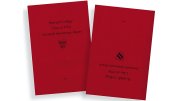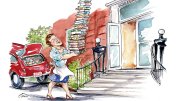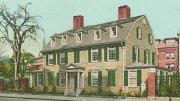Given separate Commencement and reunions/Alumni Day celebrations, Primus could not devote full attention during the pomp-cum-protests that marked this year’s 373rd exercises. Returning to reflect, he notes that Bertram A. “Bert” Huberman ’44, M.B.A. ’48, was an eightieth-reunion attendee this year, a first (see harvardmag.com/oldest-alums-24). But beyond sheer longevity, the elders had some wisdom to offer the relative youngsters who run the University today, teach in its classrooms, and partake of that teaching.
John T. Bethell ’54, who edited this publication brilliantly until 1995 and has, as secretary of his College class, edited the last six of its 15 reports, rightly observed that the period between the sixty-fifth and seventieth reunions was “drastically different from any five-year interval in our experience.” He listed the pandemic, Russia’s invasion of Ukraine, the Hamas terrorism and new Middle East war, and the events of the past academic year that left Harvard “shaken.”
First Marshal George S. Abrams put things in even longer perspective (“all of us in our nineties”), citing revolutions in technology, the rise and fall of Nazism, the Holocaust, the endless major wars, and the collapse of the Soviet Union. On the “elephant in the room” (Harvard’s troubles), he combined that historical sense with his own experience of, and pride in, his classmates’ lives well lived to offer alma mater a reassuring pat on the shoulder:
“This is not the first time Harvard has been thrown into crisis, either for its actions or for its failures to act. It likely will not be the last. Yet Harvard is much more than its presidents and administrators. It is far more important and complex than any one person or any one event.
“On a daily basis…[s]cientists work in laboratories and make medical breakthroughs. Professors work on books that illuminate us all.…Most importantly, professors and other faculty enlighten students in all areas of their lives…and those students will go on to contribute to society just as our class has done over the years.…
“Think of the vast changes [today’s] graduates will see in the next 70 years. And think, too, of all the things those classes will contribute to their professions and to society, just as our class has done. And think of Harvard’s role in each individual member’s development and life.”
One interesting development not explicitly addressed by Bethell or Abrams is embodied in the class report itself. Because Harvard and Radcliffe were separate entities until the late 1960s, the records of the two cohorts remain separate in the red book, which comes with two front covers, aligned in opposite directions, and flipped contents. To graduates of a certain age, this all makes perfect sense. And it is, graphically, a useful reminder that over time, major changes for the better in communities, societies, and cultures do take place, even in tradition-bound institutions like this one.
As Radcliffe class secretary Joanne Sacco Pugh wrote in the report, “We tolerated rules that barred us from Lamont or any visibility in Harvard’s publicity (moving us out of camera eye during filming in Soc Sci 2)….” Try running that past the students enrolling this August, who no doubt view the idea of a gender-separated Crimson education with utter disbelief: so last millennium.
Another way Harvard has evolved to embrace talented people from all walks of life was evident on May 31. As Michael D. Lewis ’93, an Alumni Association elected director 2020-2023 and co-chair of the chief marshal selection committee, observed of Alumni Day (see harvardmag.com/alumni-day-24), “All three of the featured alums were African American men”: Chief Marshal Baratunde Thurston ’99, HAA President Tracy “Ty” Moore II ’06, and speaker Courtney B. Vance ’82. That lineup “seems particularly meaningful,” Lewis noted, in the wake of President Claudine Gay’s resignation before she could keynote the day.
Gay was mentioned only in passing on May 23 (“Commencement 372 7/8,” July-August, page 10). But according to the Crimson, during the celebration of black graduates in Sanders Theatre two nights earlier, the faculty award for demonstrating “a strong commitment to social justice” was bestowed on Gay in absentia and accepted by Divinity School Dean Marla Frederick. Recognizing the “remarkably bittersweet” nature of the award, Frederick hailed Gay as “our forever president.”
Storm and change indeed, but trials and changes from which Harvard, in the seasoned view of some of its eldest alumni, and the hopes of its youngest graduates, will again progress.








